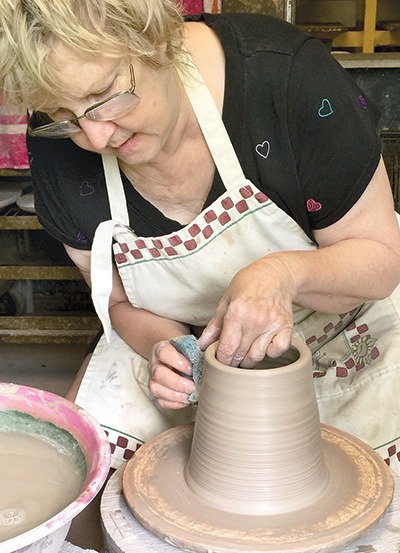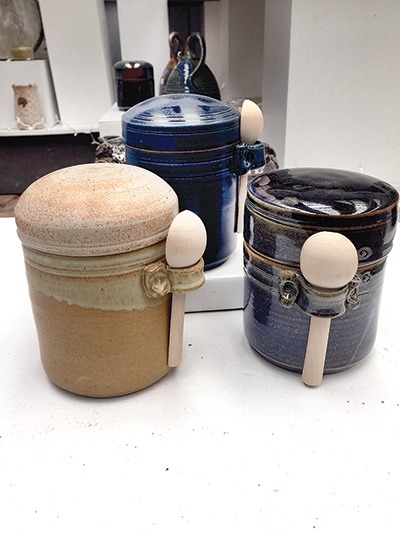
story and photos by Tom Chillemi
Clay artifacts from many ancient cultures survive and offer clues on how people in the distant past lived, according to Karen Podd, who with her husband, Robert Podd, created “The Poddery” in Mathews. These ancient finds include not only luxury clay pieces, but everyday items as well.
For 42 years the couple has been “throwing” pots, creating lasting art from clay at their studio and kiln located just off Route 14 at Foster. Their life’s work is linked to those who for centuries took the most basic element — clay — and transformed it into something useful, as well as beautiful and enduring.
“Clay and history go hand in hand,” said Karen Podd. As an example, she points to the fact that ancient trading ships have been found by discovering oil and wine amphora still stacked neatly in their holds showing the shape and size of the ship, where no wood remains. Clay artifacts are among the few things that remain of empires that have turned to dust.
Closer to home, clay smoking pipes, stems and bowls, tavern mugs, and fine porcelain wares survive from as far back as colonial times and indicate when they were used and where they were produced.
Who knows which Poddery piece might be unearthed in an archeological dig someday?
Teachers
Karen Podd fell in love with clay at Northern Illinois University, DeKalb, Ill. as part of her Art Education degree. “There’s a saying, ‘You’re only as good as the techniques you’ve learned from those who taught you,’ ” said Podd. “I was lucky and now grateful enough to have had two excellent teachers who stressed sound techniques in throwing clay. There were very few books and no videos to learn how to throw back in those days, 55 years ago.”
Art with science
A lot of science goes into the art of pottery.
“The artist part is how someone studies how a plant stem is attached to a vegetable for an idea for a handle for a pot,” explained Podd. “Three-dimensional clay is a piece of sculpture even though it’s a teapot, vase or casserole dish.”
Science is needed to make a potter realize that centrifugal force and gravity need to be controlled when working with wet clay — whether it’s on the wheel or hand building, she said.
The Poddery’s clay formula is mixed by a company in Richmond. “We usually get a ton at a time delivered to us,” Karen said. The Podds formulate and mix their own glazes from raw chemicals to match the shrinkage rate of their clay.
In its unfinished state, clay must be protected from air. Plastic is used today. Years ago, artists used cloth and wet bricks around a piece of damp cloth on the piece and hoped for the best, she said.
“Firing” clay depends on what temperature the specific clay matures. “Low fire” clay cures at around 1,000 degrees Fahrenheit or lower and an electric kiln can be used. “High fire” clay needs 1,500 to 3,000 degrees and this is where experience is so important. Kilns must be made of materials like firebrick to withstand the heat.
The Poddery’s kiln, built by Robert, is made of hard fire brick for the main structure and soft fire brick for the door to close its opening. “We fire to 2,400 degrees, which makes our clay products oven, microwave and dishwasher safe,” said Karen. “But they are not meant for the top of a stove.”
They fire with propane gas and use about 150 gallons to get up to 2,400 degrees. It takes about 10 hours slowing turning up the gas to reach 2,400 degrees and about 24 hours to cool down before they can open the door and unload the 175 pieces inside. “You know that saying, ‘This is dangerous, don’t try this at home,’ well the same goes for firing!”

Satisfaction
Production can be tedious and throwing 50 of the same thing is monotonous, Karen said. “But the joy is when a customer tells us they’ve been using the same casserole for 15 years and they love it; or some one using our mugs says the handle just fits their hand perfectly.
“It’s also gratifying when newly married couples that have received our work as gifts have come to the studio to add items.”
People that know or have the Podds’ work have commissioned special projects. “This is the challenging creative one-of-a-kind stuff that I love to do,” said Karen. “It makes me see designs while I sleep, and makes me sketch tons of drawings and side views!”
Some examples are fireplace fronts using marsh grass pressed into the clay to give it texture, large relief walls for entrances to homes or restaurants, back splashes for stoves.
The Podds have also created relief wall fountains, many one-of-a-kind fire place fronts and hearths, reproduction work for the gardens in Colonial Williamsburg, terra cotta forcer pots for the vegetable gardens and greenhouse at Monticello, delft tiles depicting the history of Mathews plus clay trim for a three-sided fire place, and a 60-foot relief wall behind the bar at Barrets Restaurant on the Main Street in Williamsburg.
Classes
“I have given private wheel lessons from time to time and small classes making terra cotta Japanese dragons after working with an Okinawan potter who lived with us and was the son of a ‘Living Treasure of Japan’,” Karen said. “I would like to do these once again if there’s interest.”
Tours of The Poddery are given for groups who make reservations.
The Poddery is open 10 a.m. to 5 p.m. everyday. For information, call 725-5956 or visit thepoddery.com.


